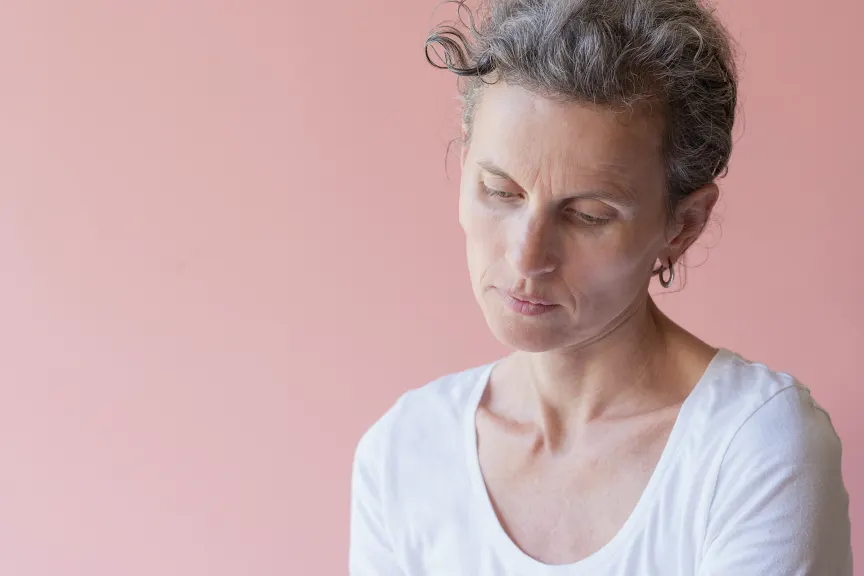Real Talk (and Expert Insight) on Menopause
Hot and cold flashes, chronic sleep disturbance, loss of libido, thinning hair—not every woman experiences every symptom but some actually get them all.

Valerie wondered ifshe’d ever want sex—solo or with another person—ever again. Nikki’s cold flashes left her shivering and soaked in the middle of the night. And Liza’s weight gain took her totally by surprise.
Three women, three different experiences—but the shared truth is none of them were fully prepared for the menopausal ride. And they’re not alone. The relationship women have with this transition is as personal as their symptoms are—some get through it without much disruption, while others literally sweat it out, finding it to be one of the most challenging times in their lives. And you likely won't know which camp you'll fall into until you go through it yourself.
So, what is menopause, exactly? Technically, it means you’ve gone 12 months without having your period. But most women don’t follow that textbook definition, says Heather Hirsch, M.D., clinical program director of the Menopause and Midlife Center at Brigham and Women’s Hospital in Boston. Instead, many go through perimenopause—the phase leading up to when your periods stop—that lasts anywhere from one to (wait for it!) 10 years.
“The average length of symptoms is about five to seven years. That’s just the average,” explains Dr. Hirsch, who is also an instructor in the women’s health division at Harvard Medical School. “There’s definitely this myth that[you’ll experience one]year that’s really bad, and then, whew, you’re back to normal. Well, no, your body’s completely different, and it’s always going to be post-menopausal.” For 10% of women, the symptoms of menopause last the rest of their lives, she adds.
The Body on Less Estrogen
During puberty, your body ramped up its production of estrogen, progesterone, and, to a lesser extent, testosterone, priming you for sex and childbirth. Menopause is the opposite—your ovaries stop producing these hormones, so levels drop dramatically.
“We call them sex hormones, and we think about them for sex. But they have numerous functions, from core body temperature to metabolism, to sexual function, to mood, to memory, to cardiovascular health,” says Dr. Hirsch. For example, estrogen helps the brain regulate your body temperature and metabolism, and it has protective benefits for the heart (and possibly the brain). These benefits may explain why some post-menopausal women have an increased risk of developing both heart disease and Alzheimer’s disease.
但研究人员仍然不知道为什么妇女症状一旦雌激素水平垂直就可以通过地图全部。“这里的消息是我们开始获得这种激素真正影响每个器官的照片。并且,不仅有环境因素,但博士博士说,不仅存在竞争中的环境因素,而且肯定的遗传因素也是如此。
One clue to the importance of your genes: Your menopause experience may mirror you mom’s symptoms. One theory is that your genes influence how estrogen receptors work. Estrogen receptors are the molecules that receive signals from the hormone. You have these receptors in every part of your body—the brain, the vagina (naturally), your heart, and joints—binding with all the estrogen floating around during your child-bearing years.
“当我们失去雌激素时,有广泛的情景,但在光谱的一端,你的受体说,'你知道什么?雌激素不会回来,所以我要近距离购物。“那些受体,因此,消失了,”赫希博士解释道。如果你陷入这个营地,你可能会产生较小的症状。
在另一个极端是女性的身体是马king more receptors to find whatever estrogen may still be around. In this case, your body thinks it’s being helpful by ramping up those receptors—but it may actually be making things worse. “When estrogen’s not there, the signaling can get really haywire,” as if your body was frantically clicking a light switch on and off, Dr. Hirsch explains.
许多女性在这两极之间落在某处。而且,仍有许多研究人员没有答案,包括环境饮食和运动如何,接触化学品和压力 - 可能影响你的基因。例如,有一些证据表明,早期创伤(包括身体虐待和性豆类)可能在更年期期间更糟糕,至少根据一项研究。但对每个女人来说,这可能不是真的。虽然有孩子和母乳喂养可能会延迟更年期的开始,但根据一些研究,目前尚不清楚分娩是否会影响症状的严重程度。
There are also no standard symptoms, says Dr. Hirsch. Sure, everyone’s heard of hot flashes—80% of menopausal women have them—but vertigo? Not so much. Yet vertigo, brain fog, thinning hair, weight gain, and insomnia all can be tied to the loss of estrogen and its effects on the tissues of all your organs.
Valerie, Nikki, and Liza each experienced a wide range of such symptoms as they navigated their change in life, offering you a glimpse of how menopause could affect you.
不眠之夜和性欲地改变
最恼人的症状对瓦莱丽,53岁,of Southern California, are the sleepless nights, which happen at least once a week. “That’s a real hard one—waking up every 20 minutes to an hour. Then the insomnia keeps me up, and my brain decides that it’s going to spend that time worrying and projecting, over and over,” Valerie says.
That’s surprising for someone who was a kids’ empowerment entertainer—teaching kids about positive energy—until the pandemic shut down her job. But menopause has made her moodier. “I’m more down in the dumps … My focus is bad. My attitude’s bad. I say bad words,” Valerie admits. Even her friends notice she’s more prone to snapping.
Before menopause, her go-to to go to sleep aide was masturbating. “It was great. But now I have no desire. It’s hard to reach climax. That’s probably one of the hardest parts too, because I really enjoyed that part of my life. But the libido thing is gone for a while and I hope it comes back,” she adds.
睡眠障碍,性欲丧失,情绪低落是许多女性经历的东西,来自寺庙大学医学院的研究人员通过从妇女收集的数据经历更年期后发现。大约37%的睡眠问题,42%通过性问题(如阴道干燥或失去驱动),近17%感到沮丧。五个百分之五次。
But your drive can go the opposite way, too, as your hormones fluctuate. Nikki, 47, who lives suburban Orlando, FL, has found that her interest in sex peaks right before she gets a period—which is how she knows she’s about to get one, since her cycle has been stop-and-go for a couple of years now.
热,是的,冷闪烁
In her early 50s, Liza, 58, of New York City, started having hot flashes that woke her up at night, though she didn’t really realize what they were. That soon changed when she began having them during the day.
“他们是全吹泥浆,汗水会倒在我的脸上10分钟。他们又发生了每半小时左右,“她说。她在地铁上用她带着一个粉丝,所以她可以在特别糟糕的闪光灯后冷却。她总是有纸巾咀嚼汗水,她停止使用面部保湿霜,因为“只是把它放在让我汗水上。”
那么,热闪光的交易是什么?在你的大脑内部是锥形下丘脑,其中包括控制体温和激素生产。当雌激素水平下降时,下丘脑具有较难的时间,保持核心温度稳定。如果大脑感觉到你的身体越来越热(即使不是,真的),下丘脑将触发血管扩张以摆脱额外的热量。
Those hellish hot flashes made Liza miserable, so she asked her gynecologist about hormone therapy (HT). HT are pills or patches that pump female hormones back into your body. Not everyone is a good candidate for hormone therapy. Women who have a history of breast cancer or blood clots are considered at higher risk for strokes or breast cancer because estrogen plays a role in both. But for most women, these risks are minimized if you’re put on a low dose and you start before age 60 (or within 10 years after your last period).
Liza’s gynecologist was reluctant to put Liza on it because she had a family history of breast cancer. “She asked me to make some lifestyle changes—cut out alcohol before bed, exercise more—and come back in six months. I went back in six months after nothing had changed. She put me on a low dose of HT right away,” says Liza.
There’s a reason why lifestyle changes may not have been enough to improve Liza’s symptoms. “Certainly, if you sleep better, if you just overall have a healthier diet, if your mental health is in check, if you have a good support system, those things can help,” says Dr. Hirsch. “But I really always tell my patients, ‘There’s a huge chunk of this that is out of your control.’”
That’s why Dr. Hirsch also talks about HT with her patients. “For the majority of women who are finding that their symptoms are affecting their quality of life, or they’re having more bad days than good days, almost always hormone therapy does help, once we find the right regimen or route for the patient,” she explains.
对于Liza,HT帮助减轻了闪光的强度,但没有结束它们。(“这让我伤心,”她承认)。即使是现在,她仍然热烈闪烁,每天五六次闪烁。“他们不是全吹,汗水倾倒 - 我的脸部剧集,但它们在夏天令人恼火,更糟糕的是,丽莎笔记。
与此同时,每月两次或三次,晚上尼克基变冷了。像热闪光一样,冷闪光是另一个标志,你的大脑正在努力控制你的身体的温度。有时它们发生在热闪存后发生(一个根本没有叫醒你的)。赫希博士解释说:“在热闪光后,很多人都会变冷,因为他们的身体正试图蒸发所有的汗水。”
“Nine times out of 10, I can just get changed and go back to sleep, but there have been a couple of occasions where I've had to full on get up and change the bedding,” Nikki says.
Extra Weight Around the Middle
“The weight gain took me by surprise,” says Liza, who carried those extra pounds around her belly and waist. “I’m tall, so I get away with it, but tunics became my friends, and I’ve gone up a size in some clothes.”
Since she’d never gained weight that quickly, she even went to her doctor because she thought she might have diabetes. She didn’t, but there are reasons why menopause can do a number on a woman’s weight.
For one thing, your metabolism becomes more sluggish with the decline of estrogen, says Dr. Hirsch. And those extra pounds now gravitate toward your abdomen instead of your hips. There’s also a link between low estrogen and insulin resistance, one reason why post-menopausal women are at higher risk for developing type 2 diabetes than women in their child-bearing years.
疼痛肩膀和心悸
在尼克基的奇特症状中是一种唠叨,在右上肩膀中的间歇性疼痛,类固醇射击没有固定(她的提供者认为她撕裂了肌肉)。但这也可能是与更年期相关的,赫尔斯博士博士。“我们所知道的是,通常雌激素的丧失会导致关节缩视,医学术语疼痛的关节。但是,我们的关节中有雌激素受体,所以发生同样的事情 - 他们正在寻找雌激素,雌激素不再存在,所以生理尖叫可以像髋关节一样发挥作用,“她解释道。
Valerie hasn’t noticed any pain in her joints, but she does have heart palpitations two or three times a week. Her heart does what she describes as “this whole funky, fancy dance beat” for a few minutes at a time that leave her weak and dizzy. Researchers from the University of Indiana School of Nursing found that they affected roughly one in four women, and the odds increased if you were sleeping badly or were stressed.
Heart palpitations are also common during perimenopause when estrogen is fluctuating, says Dr. Hirsch. Estrogen affects the rhythm of your heart, and when it drops, it can cause your heart to beat irregularly (the condition is known as premature ventricular contractions, or PVC).
Thinning Hair and Hair Loss
For Liza, one of the “worst” symptoms has been the most recent: thinning hair. “About a year ago I saw a picture of myself in a pool, and you could see my scalp through my wet hair! I was mortified,” she says. “I’d gladly deal with the other symptoms if I could just get my hair back!”
The culprit behind thinning hair? You guessed it—declining estrogen (and progesterone, another sex hormone). When you have a normal amount of these two hormones, they keep your hair in its growth stage for longer, which means it grows quickly and stays on your head longer (remember pregnancy?). Once they start to plummet, hair grows in more slowly—so the amount you lose becomes more noticeable. And even though Liza’s tried Rogaine and is on HT, so far, nothing has worked.
By now, you may be thinking there’s not much to look forward to when you go through menopause, except an end to your periods—which is “pretty great,” Liza admits. But here is one message to take away: No matter how strange or embarrassing your symptoms are, speak to your provider.
“我想鼓励女性为自己倡导,并了解他们身体发生的知识,”赫尔希博士说。如果他们觉得自己的医生正在不清,那么她就是向女性建议去绝经。organd search for a NAMS provider, which is a doctor who’s had extra training in menopause-related topics. “In all honesty, that makes a huge, huge difference,” says Dr. Hirsch in the kind of information and care you ultimately receive.
Last names have been omitted for privacy.
创伤和更年期症状:JAMA Internal Medicine。(2019.) “Associations of Intimate Partner Violence, Sexual Assault, and Posttraumatic Stress Disorder With Menopause Symptoms Among Midlife and Older Women.”pubmed.ncbi.nlm.nih.gov / 30453319 /
Childbirth and Menopause:JAMA Network Open。(2020.) “Association of Parity and Breastfeeding With Risk of Early Natural Menopause.”pubmed.ncbi.nlm.nih.gov/31968114/
Hot Flashes and Menopause:Journal of Midlife Health。(2019.) “Menopausal Hot Flashes: A Concise Review.”ncbi.nlm.nih.gov/pmc/articles/pmc6459071/
Sex, Sleep, and Mood in Menopause:妇女健康杂志。(2015.)“沮丧情绪的症状,睡眠不安,中西亚女性的性问题:来自全国妇女健康研究的横断面数据。”pubmed.ncbi.nlm.nih.gov/25621768/
雌激素在胰岛素抵抗中的作用:病理肿瘤学研究。(2012.) “Interplay between insulin resistance and estrogen deficiency as co- activators in carcinogenesis.”pubmed.ncbi.nlm.nih.gov/21984197/
Heart Palpitations During Menopause:妇女健康杂志。(2020.) “A Menopause Strategies–Finding Lasting Answers for Symptoms and Health (MsFLASH) Investigation of Self-Reported Menopausal Palpitation Distress.”liebertpub.com/doi/10.1089/jwh.2020.8586





